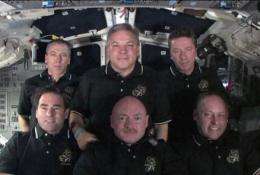This image released by NASA shows the STS-134 crew aboard space shuttle Endeavour talking to reporters during a live in-flight media event. The crew members: Commander Mark Kelly (front-C), Pilot Gregory H. Johnson (rear-C) and Mission Specialists Michael Fincke (front-R), Greg Chamitoff (front-L), Andrew Feustel (rear-L) and European Space Agency astronaut Roberto Vittori (rear-R).
US astronaut Mark Kelly, who is commanding the shuttle Endeavour's final space flight, said Tuesday he is concerned about a drain of NASA talent once the US shuttle program ends later this year.
"I think what is always at risk is, as we transition to a new program and a new vehicle there is going to be a period of time when Americans aren't flying on US spacecraft, so that's a challenge," he said in an interview with US media, broadcast from space on the last day of the shuttle's mission.
"People leave, you know, engineers and operations people will move on and do other things, so it is the corporate memory that I think I am most worried about," said Kelly, 47.
"But over time, we will get the right mix of people. NASA has an incredible workforce, it is very talented and you know, from the late 1950s to today we have taken on great challenges and we have never failed."
Endeavour is scheduled to land early Wednesday at Kennedy Space Center in Florida, wrapping up a 16-day mission to the International Space Station.
Atlantis is set to launch on July 8, marking the last-ever flight by a US shuttle. Thousands of NASA employees are being laid off as the 30-year program draws to a close.
Once the shuttles make their way to museums across the country to serve as tourist attractions, the world's astronauts will hitch a ride to the orbiting space lab aboard Russia's Soyuz space capsules at a price of more than $51 million a seat.
Private companies are working to build a replacement vehicle for the shuttle, which would likely be ready no earlier than 2015.
"There is going to be a period of time when we are going to develop our next generation of launch vehicles and it will be a challenging transition but I expect great things," Kelly said.
"I think we are always concerned about the future. I mean this is our career," he added.
It would take "five or six years" to have a new spacecraft ready to launch, and in the meantime "we will continue to fly on the Russian Soyuz," he said.
"Transitions are sometimes difficult but we have confidence in NASA and NASA management that we will steer through this period of time and come out on the other side with a really vibrant space program."
Kelly also said he spoke regularly with his wife, US congresswoman Gabrielle Giffords of Arizona, while he was in space and was pleased with her recovery after surgery to replace a part of her skull that was destroyed in a January shooting.
"It was nice to be able to call her each day after about flight day four," he said.
"I could tell a difference on the phone when speaking to her so that's all positive and her recovery is going really, really well."
Giffords has been undergoing rehabilitation after she was shot in the head by a gunman who went on a rampage at a meeting she was holding with local voters, killing six people including a federal judge and a nine-year-old girl.
"I am really, really looking forward to seeing her," Kelly added.
Reflecting on his final flight aboard a US shuttle, commander Kelly described the experience as "certainly bittersweet."
"It will be sad to see it retired but we are looking forward to new spacecraft and new destinations," he said.
"Hopefully we will get an opportunity to go back to the moon or go on to Mars, (or) an asteroid. We are really excited about the future."
(c) 2011 AFP
























